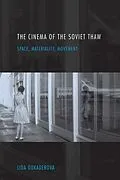Following Joseph Stalin's death in 1953, the Soviet Union experienced a dramatic resurgence in cinematic production. The period of the Soviet Thaw became known for its relative political and cultural liberalization; its films, formally innovative and socially engaged, were swept to the center of international cinematic discourse. In The Cinema of the Soviet Thaw, Lida Oukaderova provides an in-depth analysis of several Soviet films made between 1958 and 1967 to argue for the centrality of space-as both filmic trope and social concern-to Thaw-era cinema. Opening with a discussion of the USSR's little-examined late-fifties embrace of panoramic cinema, the book pursues close readings of films by Mikhail Kalatozov, Georgii Danelia, Larisa Shepitko and Kira Muratova, among others. It demonstrates that these directors' works were motivated by an urge to interrogate and reanimate spatial experience, and through this project to probe critical issues of ideology, social progress, and subjectivity within post-Stalinist culture.
Autorentext
Lida Oukaderova is Assistant Professor of Film Studies in the Department of Art History at Rice University.
Inhalt
Acknowledgments
Introduction
1. The Persistence of Presence: Soviet Panoramic Cinema
2. Mimetic Passages: The Cinema of Mikhail Kalatozov and Sergei Urusevskii
3. The Architecture of Movement: Georgii Danelia's I Walk the Streets of Moscow
4. A Walk Through the Ruins: Larisa Shepitko's Wings
5. The Obdurate Matter of Space: Kira Muratova's Brief Encounters
Conclusion: The Otherness of Space
Bibliography
Filmography
Index
